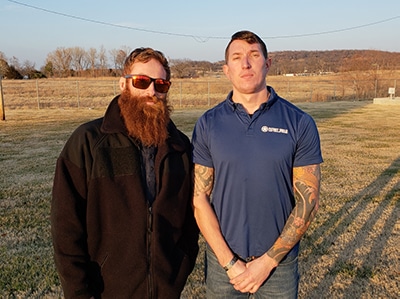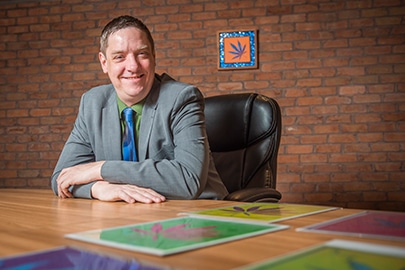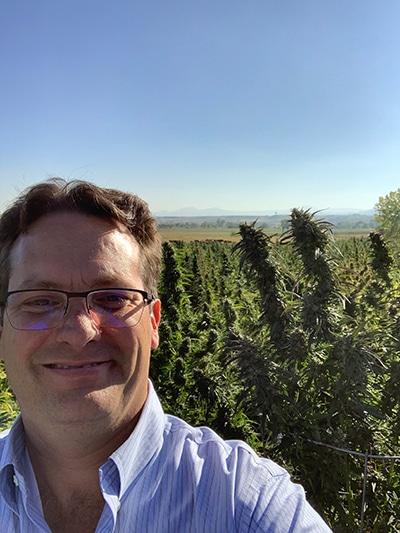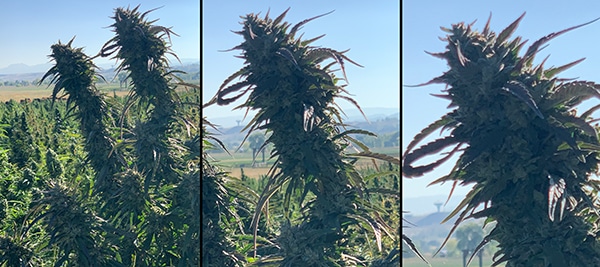by Rebecca Beyer
June 12, 2020
In January 2019, four men were pulled over by police in Pawhuska, Oklahoma, and found to be carrying nearly 20,000 pounds of what smelled like marijuana in the back of a big rig. The men claimed they were trans- porting industrial hemp, but the officers on the scene weren’t taking any chances and subsequently booked them all into the Osage County Jail. Even Matthew L. Lyons JD’99, who went on to represent two of the men, was initially skeptical of their claim.
“Twenty thousand pounds of something in the back of a truck and you’re telling me it’s completely legal?” asks Lyons, who practices out of Tulsa. “I was one of the first skeptics.” — Matthew L. Lyons JD’99, Tulsa, Oklahoma practice
The farm bill that Congress passed and President Trump signed into law in December 2018 removed hemp from the list of controlled substances, so if that’s what the defendants — who faced felony marijuana-trafficking charges and the possibility of life in prison — were truly carrying, their arrests would have been unwarranted. But several days after they were jailed, confusion continued to abound. Part of the problem? There’s no easy way to determine whether cannabis is marijuana or hemp (the U.S. Drug Enforcement Administration put out a request for information on field test kits in February). And test results vary depending on a variety of factors, including whether the product was completely dry when it was analyzed.
“We still don’t know what we have yet; we are in a holding pattern right now.” — Osage County prosecutor
Indeed, the entire United States seems to be in a holding pattern when it comes to the legal issues surrounding cannabis. In a world of black-letter laws, cannabis-related products and businesses exist in a seemingly perpetual state of gray. Whether someone can legally grow, purchase, sell, or use cannabis de- pends, in most cases, on which state he or she lives in, and, perhaps, how willing that person is to risk running afoul of an ever-evolving civil and criminal legal framework.
At the Cutting Edge of Cannabis Law
Across the country, Vermont Law School graduates are helping shape that framework. As with Lyons in Oklahoma, they are attorneys defending people facing charges in criminal cannabis cases. They are prosecutors filing — or deciding not to file — charges in criminal cannabis cases. They are transactional attorneys advising cannabis- related companies on compliance. And in Vermont, as state legislators and legislative counsel, they are literally writing the laws that govern all of the above.
Although they bring different expertise and experience to their work, these VLS alumni generally share a sense that marijuana laws have been used unfairly to target certain groups of people, including people of color (in 2018, The New York Times found that blacks in New York City were eight times more likely to be arrested for low- level marijuana charges than whites, and Hispanics were five times more likely; other cities and states have found similarly startling racial disparities). They also share an excitement for the intellectual challenges that come with practicing in such a dynamic area of the law.
“I find it extremely satisfying and interesting to help educate people about what they can and can’t do, and when they’re crossing that figurative line” — Colorado attorney Frank Robison JD’12
“I find it extremely satisfying and interesting to help educate people about what they can and can’t do, and when they’re crossing that figurative line,” says Frank Robison JD’12, a Colorado attorney who represented the company buying the cannabis in the Oklahoma case. “I advise them where that line is, and I don’t work with people who cross it.”
After leaving Vermont Law School, Robison earned an LLM in entrepreneurial law and wrote his master’s thesis on deploying capital in the cannabis industry. One of his first forays into the field was as a special assistant attorney general in Colorado assigned to the University of Colorado system. Researchers wanted to study cannabis but were afraid doing so would jeopardize their federal funding because cannabis was a controlled substance at the time. “None of the other special assistant attorneys general were interested in tackling the problem,” he recalls. “So, I really waved my hand high and wide to my bosses.”
Eventually, Robison helped researchers find a way to study the effects of cannabis without risking the school’s federal funding. The solution? To take their experiments off campus with a mobile laboratory in which scientists could perform a variety of tests on marijuana users. Today, Robison, through the Robison Law Group (also known as TheHempLawFirm.com), mostly represents businesses in transactional matters. A major component of his work is advising domestic and international clients on how they can bring cannabidiol (CBD) products to the market in accordance with current and potential future requirements of the U.S. Food and Drug Administration (FDA).
Familiarity with CBD regulations is also a major part of the job description for Alex Dos Santos JD’15. The former professional snowboarder is in charge of business affairs and sports marketing at NanoCraft Sciences, a CBD company based in La Jolla, California.
“We try to maintain the utmost compliance,” Dos Santos says, “even thinking ahead to what [the FDA] is probably going to rule on so we don’t have to reinvent the wheel.”
Still, a disclaimer is prominently displayed on the bottom of NanoCraft’s website: “The statements and products referred to throughout this site have not been evaluated by the FDA. They are not intended to diagnose, treat, cure or prevent any disease or condition.” And, in less than a year on the job, Dos Santos already has tweaked labels (from “pain stick” to “muscle and joint stick,” for instance) and wrangled with how to ship products that are still illegal in some states and countries. Because NanoCraft is geared toward the sports world, he also negotiates contracts with athletes and stays on top of which sporting events allow CBD use or corporate sponsorship and which do not (Olympics: yes; motocross: no).
“I try to tread as lightly as possible and be really diligent on the research” — Alex Dos Santos JD’15, NanoCraft Sciences, a CBD company based in La Jolla, California
“I try to tread as lightly as possible and be really diligent on the research,” Dos Santos says.
Green Means Go … Sort Of
Uncertainty is the name of the game even when states have taken a gradual approach to legalization. Vermont first gave the green light to marijuana for medical purposes in 2004. In 2018, it approved limited recreational use through its legislature (rather than a ballot initiative passed by voters as other states have done). Adults in the state can possess up to 1 ounce of pot and grow up to two mature and four immature cannabis plants, but they cannot buy or sell marijuana. To date, a bill to tax and regulate pot sales has stalled, in part because of law enforcement’s concerns about how to test for impaired driving.
“It takes so much longer through the legislative process because people want to discuss absolutely everything,” says Michele Childs JD’96, who has drafted most of the marijuana-related legislation as an attorney in the state’s Office of Legislative Council (her colleague and former classmate Michael O’Grady JD’96 has written Vermont’s hemp-related laws). “It really gets vetted and talked about year after year, and at some point, they see if they can get enough votes and the governor will sign something.”
The state’s piecemeal approach has led to some creative marketing by would-be cannabis entrepreneurs. In July 2018, Vermont’s attorney general issued an advisory warning people against “gifting” marijuana with the purchase of another product or charging someone a delivery fee for a “free” sample of pot.
“We have this situation where we’ve legalized it, but people can’t get it unless they grow it themselves, so the black market is thriving,” — Vermont Senator Joe Benning JD’83
“We have this situation where we’ve legalized it, but people can’t get it unless they grow it themselves, so the black market is thriving,” says Vermont Senator Joe Benning JD’83, a Republican who has sponsored marijuana legislation in the state. Timothy Bryon Fair JD’12, who launched his Burlington- based cannabis law firm in 2018, agrees.
“Half-assed legalization inspires people to try to find every loophole,” he says. Fair has advised clients on the risks of trying to skirt the ban on sales with gifts; defended the owner of a skateboard shop against federal marijuana charges; and won dismissal of state felony charges against a licensed hemp grower who was arrested for having four mature plants instead of two after police obtained a search warrant based on the smell of marijuana. Benning says that when it comes to pot, criminal sanctions seem particularly disproportionate. “We have an internal joke [in the legislature] that somebody high on heroin or alcohol would blow through a stop sign, and someone high on marijuana would sit there and wait for it to turn green,” Benning says. Some reform-minded prosecutors are taking matters into their own hands, using their discretion to push back on what they see as arbitrary laws. Chittenden County State’s Attorney Sarah George JD’10 says marijuana-gifting cases are not a priority for her office, and she has directed her staff not to charge people who possess up to 2 ounces of pot, even though that’s double the legal limit.
Such actions — or inactions, as the case may be — are in line with her overall approach to criminal justice; George is part of Fair and Just Prosecution, a group of prosecutors committed to fairness, equity, compassion, and fiscal responsibility. But there’s also a more practical component to her thinking. After she took over as her county’s state’s attorney in 2017, George helped people expunge past convictions for possessing amounts of marijuana that are now perfectly legal. She doesn’t want to rack up new convictions that can likely be expunged in the future.
“With this bigger conversation about tax and regulate coming, I feel uncomfortable charging anybody for up to 2 ounces if we’re just going to have to do this whole thing again in a couple of years,” she says. “That just feels like a lot of extra work, not to mention unjust.” Benning, who says he has “sat through literally hundreds of hours of testimony” and traveled to Alaska, California, Oregon, and Colorado learning “the good, the bad, and the ugly” about cannabis, feels the law hasn’t yet caught up to societal views on the issue.
“But the real story is the arrest of four people who truly believed they were participating in a legal act. Let’s get clarity when you don’t have guys who have 15 years to life hanging over their heads.” — Matthew Lyons JD’99
“But the real story is the arrest of four people who truly believed they were participating in a legal act. Let’s get clarity when you don’t have guys who have 15 years to life hanging over their heads.” Matthew Lyons JD’99
“The population has gone one way, and the government, being stupid, has gone the other,” he says. “Legalization and commercialization of a retail market that is regulated by the state and taxed appropriately is a move in the right direction.”
In the meantime, trying to form legitimate cannabis-related businesses is a challenge. Fair said it took him six months to find a bank that would open an account for his law firm, even though his work is not “plant-touching in any way, shape, or form.” He also initially had a hard time cultivating a network of professional services — insurers, accountants, bookkeeping companies — that he could recommend to his clients.
“I’d get as far as the word cannabis,” he laughs, “before the conversation was shut down on the other end.”
Looking for Clarity
The Oklahoma case is a good example of how hard it can be to get things right. The broker buying the cannabis, represented by Robison, and Lyons’s clients—Andrew Ross and David Dirksen, partners in a security company called Patriot Shield—did everything they could to ensure they were on the proper side of the law. Patriot Shield had a contract showing they had been hired to provide security and logistics for the transport of the goods from a grower in Kentucky to the broker in Colorado. The broker had a contract with the grower that stated the broker wouldn’t take possession of the cannabis if it was anything but hemp. The product was insured through Lloyd’s of London. The defendants planned a route that avoided states with more restrictive cannabis laws. And, when they were stopped in Oklahoma, they cooperated fully with police and waited at the scene for Drug Enforcement Administration personnel to arrive.
“If we are drug traffickers, we are literally the worst drug traffickers ever,” — Andrew Ross, days after his arrest
“If we are drug traffickers, we are literally the worst drug traffickers ever,” Andrew Ross said in an interview in the days after his arrest. Nevertheless, the local district attorney eventually cited test results showing that approximately 4,000 pounds of the cannabis in the truck had tetrahydrocannabinol (THC) levels higher than what is allowed under the federal definition of hemp. Lyons and Robison were prepared to argue that the confiscated cannabis was not marijuana but rather noncompliant hemp. Under most relevant state laws, including Oklahoma’s, a crop that tests higher than 0.3 percent THC but less than one percent THC is destroyed but does not lead to criminal prosecution. With those percentages, “you’re still talking about the worst marijuana in the world,” Robison says. In the end, however, they didn’t have to test that theory. The district attorney’s office dismissed all charges against the defendants, accepting their argument that they did not know they weren’t carrying legal hemp (Robison’s client has since sued the grower in federal court.) Lyons and Robison both praised prosecutors for their willingness to engage on complicated issues. In their case, and so many others, it’s clear there is no shortage of interesting legal questions when it comes to cannabis. But, as they argued in Oklahoma, finding the answers shouldn’t come at the expense of someone’s personal freedom. “Is this hemp, or noncompliant hemp, or marijuana — that’s a great story,” Lyons says.
Cannabis 101
Hemp and marijuana are two different types of the cannabis plant. According to federal law, cannabis is hemp if it has less than 0.3 percent delta-9 tetrahydrocannabinol, or THC, which is the psychoactive compound that produces marijuana’s high. CBD, or cannabidiol, is derived from hemp. Because the U.S. Food and Drug Administration (FDA) has approved its use as a drug, it is technically illegal to add the compound to a food or label it as a dietary supplement. There are also limitations on how CBD products can be marketed. Nevertheless, CBD is everywhere. And even the FDA seems to recognize its regulations are not entirely clear. The agency sent a representative to the National Industrial Hemp Council Business Summit in August and has published several explanatory articles and Q&As on the topic. In response to one question — “Is it legal for me to sell CBD products?” — the FDA’s answer begins, “It depends.”



